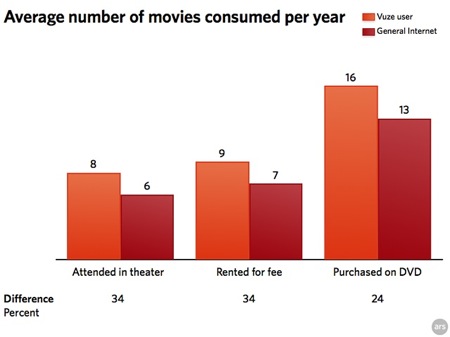THE FUTURE OF MUSIC PART 2 - TWO FACTS ABOUT SELLING MUSIC ONLINE
Posted by admin • 10/19/2009 • 11:18 pm • Comments (7)

Like I already described in Part 1, the current situation of the music business is far from being easy. So, what can we do about it? Stick our heads in the sand or try to keep all music off the internet? Hell no! The solution is neither to copy protect musical content by using DRM nor to hunt down and sue users who illegally download or copy MP3s. I think the way labels or artists have to go to successfully sell their tunes online is way different. Again, face the fact: There is always going to be piracy. The conclusion is to accept this and deal with it instead of wasting time and money fighting an endless battle you have to accept all changes happening to media reception right now. Here are two important facts which I think are an essential base for successfully selling music online:
1. Get rid of the enemy (in your head)
Peer 2 Peer users are often condemned as the ones guilty for the miserable situation the media industry finds itself in at the moment. But is this true? I do not think so. New studies reveal a different and not really surprising fact:
P2P Users spend more money on media than “normal” users.
A study, Frank N. Magid Assosiates and Vuze published in June 2009 clearly shows, that P2P users do spent (a lot of) more money on DVDs (34% more), cinema tickets (34% more), and DVD rentals (24% more) than the average non-P2P user. They also have a crush on tech-gadgets like smartphones and home cinema systems. Last but not least P2P users seem to be very well connected through social networks (55% more) and very willing to share their opinions on media and technology (52% vs 41%). This makes them opinion leaders and VERY helpful to spread the word. I think, these figures can be easily transferred to the music industry. I hope someone will do a study on that soon.
Conclusion 1: P2P users are not only spending more money on traditional media than others, they also are willing to spread their opinions being well connected to social networks, etc… Well, isn’t that the PERFECT target group?
2. Tread your customers and artists like friends

Now that we got rid of the enemy it is plain to see that we’re all friends here. Great! And how do we tread friends? Good! We do not want to accuse them of stealing right after they stepped inside invited for a party! We do not offer them a preview cake and we do not make presents which they are not allowed to bring home. Meaning: If you want users to have a good opinion about your offer, make it as comfortable as possible for them to find, listen, and buy your music. A good proof how efficient this strategy works is the study:
“Magnatune – A voluntary-based model for online music”
It was done by the American label Magnatune accomplished together with Tobias Regner (University Jena) and Javier Barria (Imperial College London) in 2005. Magnatune is a digital label which offers it’s users full length streams for preview purposes as well as a variable price model. Also, they encourage their customers to send the purchased tunes to their friends, all under their claim “We are not evil”. Like shadybrain, they also share their income 50/50 with their artists. The outcome of the study proves Magnatune right. They do not only sell their music - users even tend to spend even more money voluntarily than they have to. Regner and Barria state: “Our model explains the behaviour of Magnatune consumers who consistently pay more than the requested minimum price and even pay more on average than the recommended/default price. We conclude that reputation effects cannot play a role in this environment. Therefore, social preferences are the likely motivation of the consumers that make voluntary payments.” Great, huh?
Meanwhile sales have dropped at Magnatune, too, as you can read here but I don’t believe it is a result of their user friendly politics but more of the long-tail oriented content they offer. The new subscription model they use might serve them well hopefully.
Conclusion 2: Tread your customers good and they will be good to you. Offer as much as you can, full length previews, DRM free MP3s, encourage users to spread the word and last but not least be transparent and fair to both, your users as well as your artists.
Final Conclusion: Well, pirates and P2P networks are always going to be there, so labels as well as artists have to find clever ways to make friends within the former enemies. It is all about being a well prepared competitor to the freebies and to offer a superb quality, a good service, and last but not least: TRUST. This is the only way to act in the future of the music business.
I hope, this could give you a little impression on how a successfull business model for labels and artists might look like. Of course, this is only the beginning. I will give more detailed insights on further steps to take in the next part.



alien pimp
p2p users being important spenders in the industry doesn't mean if it wasn't for the p2p's they would spend less, au contraire.
they probably also have cars and and wear shoes, but that doesn't mean they bought those because the p2p networks. it just happens to be more or less the same niche of consumers and if it wasn't for p2p they would probably spend a lot more.
so all conclusions coming from this false premise are also false.
27.04.2010 • 01:06 am
alien pimp
P2P users being nice spenders in the industry doesn't mean if it wasn't for the p2p's they would spend less, au contraire.
they probably also have cars and and wear shoes, but that doesn't mean they bought those because the p2p networks. it just happens to be more or less the same niche of consumers and if it wasn't for p2p they would probably spend a lot more.
so all conclusions coming from this false premise are also false.
27.04.2010 • 01:04 am
James Gonzales (Music teacher)
I've got a lot of research and thank God I found one here.
Check also this link for more research results. Music manual at ctmea.org.
16.04.2010 • 09:20 am
MFDJ
The big difference is that tape copying led to degradation of sound over many copies and actually took some time and energy to do (at least with consumer level hardware) — which allowed for a decent amount of sharing but deterred wide spread piracy because the copy was essentially inferior. Now copies are identical and consumers are wondering why pay for any of it (at least that is my anecdotal experience, esp. with younger kids).
While I am a big fan of P2P (music I would likely never buy, at least not at the price I expect from 'new' music) I think we need to instill the value that it's a good practice to buy music that you enjoy. In many conversations I've had with people they just assume that it is part of their lifestyle to not pay for digital intellectual property ever. Of course traditionally musicians tend to make their money by touring/performing or licensing, not from selling albums, but that is largely because the record companies are such viscous marketers of mass products: volume is key to their profits. Smaller labels, selling directly to their fan base, without the overheard of producing physical formats (except for the connoisseurs who prefer them) or marketing or large staffs stand to be able to create nice micro-economies for themselves and their artists.
I love the download model for a variety of reasons but I think the sad thing is consumers (enthralled by cheap thrills of free shit) are missing the power of the model: cheaper product, more variety, better potential returns for artists, more direct trade… increased creativity? Yes, majors need to stop kicking and screaming and just move into the 21st century — the bad part about the anti-piracy war is that it seems like people get polarized into thinking that they are somehow being valiant or justified by pirating all intellectual property: music / software / movies / etc.
Labels are absolutely necessary in the digital age: they find, cultivate, filter, and promote artistic talent. Some of my favorite D&B tunes in the last few years come from shadybrain, KEEP UP THE GREAT JOB. I think fighting piracy by putting out promo music is decent, but it bugs me that googling a tune can lead to torrents before legitimate download sites — clearly it's more desirable to get the immediate free fix then support artists for the masses…
29.10.2009 • 08:44 am
Anonymous
Not sure if the first thing there can qualify as a fact. It is just statistics from a survey and conclusions drawn.
The second part there. I can see this as the future. It is pretty much inevitable that music be sold on donation basis. I mean your commercially available tunes are available for free regardless. The people that own the rights might as well be the ones giving it out for free. It is probably the best way to curb piracy. What do you need pirates for if you don't have to pay for it in the first place? I have my doubts about whether this will make you label or artist more successful tho. Or will you just be brushed aside and considered just another net label. And will people actually pay for it when they don't have to? For dubstep and dnb specifically? I really think this model has to begin with bigger names first in order for it to work.
21.10.2009 • 05:34 pm
Anonymous
I'm definately one of the folks who downloads a lot, but also goes on a money spending spree just to attend parties/own everything I like.
I just hate buying vinyl. Big lousy old fashioned medium. >:(
21.10.2009 • 04:39 pm
Nikko
A very interesting approach, and very true conclusions too.
Folks alway forget about tape trading back in the days. A good audio cassette copy would do then as downloaded mp3s are doing now: free promotion, not more, not less.
Hope folks in the big business will give these thoughts some thought in the future.
I like to read more, good work!
Nikko
20.10.2009 • 11:03 pm